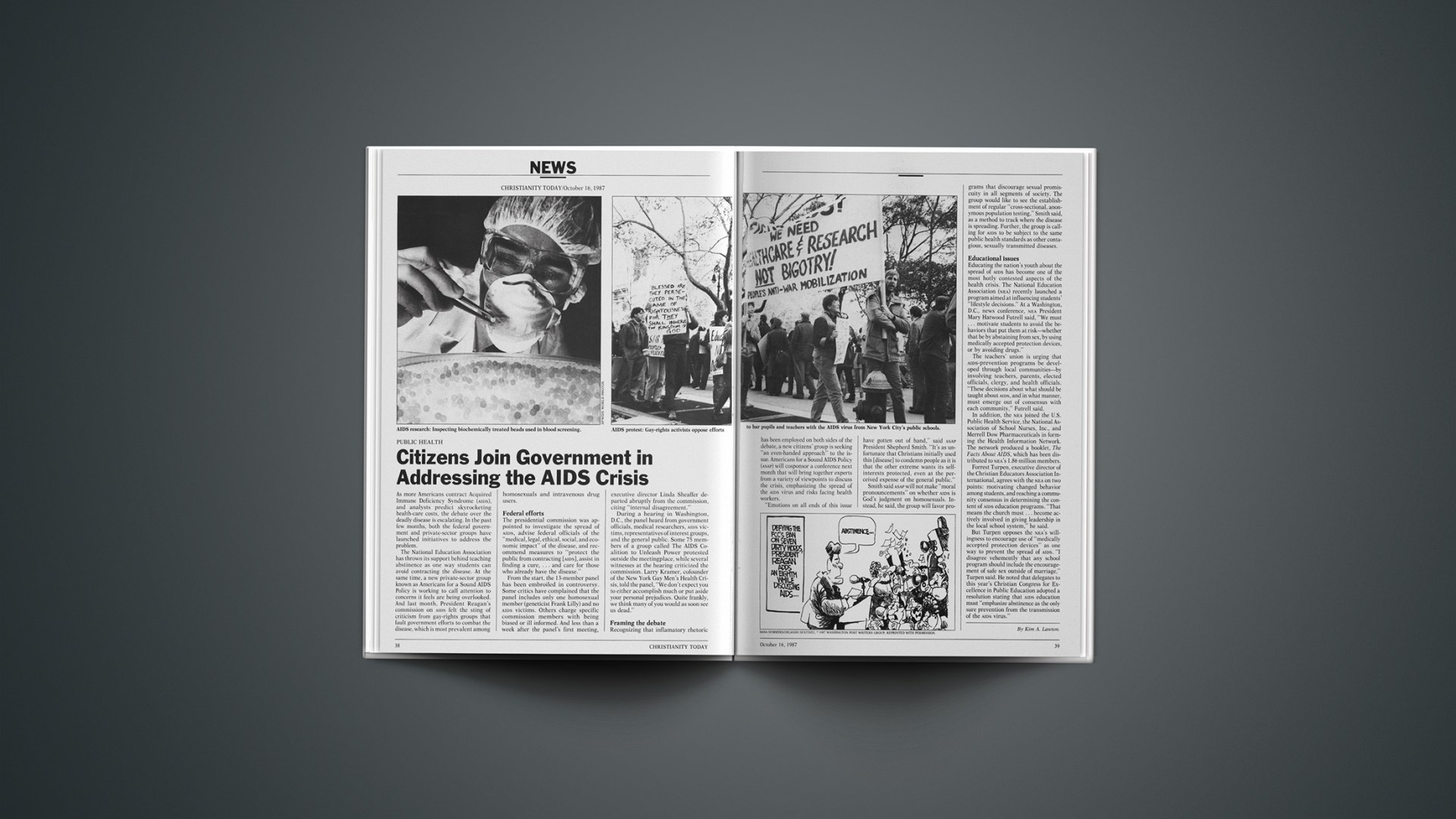As more Americans contract Acquired Immune Deficiency Syndrome (AIDS), and analysts predict skyrocketing health-care costs, the debate over the deadly disease is escalating. In the past few months, both the federal government and private-sector groups have launched initiatives to address the problem.
The National Education Association has thrown its support behind teaching abstinence as one way students can avoid contracting the disease. At the same time, a new private-sector group known as Americans for a Sound AIDS Policy is working to call attention to concerns it feels are being overlooked. And last month, President Reagan’s commission on AIDS felt the sting of criticism from gay-rights groups that fault government efforts to combat the disease, which is most prevalent among homosexuals and intravenous drug users.
Federal Efforts
The presidential commission was appointed to investigate the spread of AIDS, advise federal officials of the “medical, legal, ethical, social, and economic impact” of the disease, and recommend measures to “protect the public from contracting [AIDS], assist in finding a cure, … and care for those who already have the disease.”
From the start, the 13-member panel has been embroiled in controversy. Some critics have complained that the panel includes only one homosexual member (geneticist Frank Lilly) and no AIDS victims. Others charge specific commission members with being biased or ill informed. And less than a week after the panel’s first meeting, executive director Linda Sheaffer departed abruptly from the commission, citing “internal disagreement.”
During a hearing in Washington, D.C., the panel heard from government officials, medical researchers, AIDS victims, representatives of interest groups, and the general public. Some 75 members of a group called The AIDS Coalition to Unleash Power protested outside the meeting place, while several witnesses at the hearing criticized the commission. Larry Kramer, cofounder of the New York Gay Men’s Health Crisis, told the panel, “We don’t expect you to either accomplish much or put aside your personal prejudices. Quite frankly, we think many of you would as soon see us dead.”
Framing The Debate
Recognizing that inflamatory rhetoric has been employed on both sides of the debate, a new citizens’ group is seeking “an even-handed approach” to the issue. Americans for a Sound AIDS Policy (ASAP) will cosponsor a conference next month that will bring together experts from a variety of viewpoints to discuss the crisis, emphasizing the spread of the AIDS virus and risks facing health workers.
“Emotions on all ends of this issue have gotten out of hand,” said ASAP President Shepherd Smith. “It’s as unfortunate that Christians initially used this [disease] to condemn people as it is that the other extreme wants its self-interests protected, even at the perceived expense of the general public.”
Smith said ASAP will not make “moral pronouncements” on whether AIDS is God’s judgment on homosexuals. Instead, he said, the group will favor programs that discourage sexual promiscuity in all segments of society. The group would like to see the establishment of regular “cross-sectional, anonymous population testing,” Smith said, as a method to track where the disease is spreading. Further, the group is calling for AIDS to be subject to the same public health standards as other contagious, sexually transmitted diseases.
Educational Issues
Educating the nation’s youth about the spread of AIDS has become one of the most hotly contested aspects of the health crisis. The National Education Association (NEA) recently launched a program aimed at influencing students’ “lifestyle decisions.” At a Washington, D.C., news conference, NEA President Mary Hatwood Futrell said, “We must … motivate students to avoid the behaviors that put them at risk—whether that be by abstaining from sex, by using medically accepted protection devices, or by avoiding drugs.”
The teachers’ union is urging that AIDS-prevention programs be developed through local communities—by involving teachers, parents, elected officials, clergy, and health officials. “These decisions about what should be taught about AIDS, and in what manner, must emerge out of consensus with each community,” Futrell said.
In addition, the NEA joined the U.S. Public Health Service, the National Association of School Nurses, Inc., and Merrell Dow Pharmaceuticals in forming the Health Information Network. The network produced a booklet, The Facts About AIDS, which has been distributed to NEA’s 1.86 million members.
Forrest Turpen, executive director of the Christian Educators Association International, agrees with the NEA on two points: motivating changed behavior among students, and reaching a community consensus in determining the content of AIDS education programs. “That means the church must … become actively involved in giving leadership in the local school system,” he said.
But Turpen opposes the NEA’s willingness to encourage use of “medically accepted protection devices” as one way to prevent the spread of AIDS. “I disagree vehemently that any school program should include the encouragement of safe sex outside of marriage,” Turpen said. He noted that delegates to this year’s Christian Congress for Excellence in Public Education adopted a resolution stating that AIDS education must “emphasize abstinence as the only sure prevention from the transmission of the AIDS virus.”
By Kim A. Lawton










